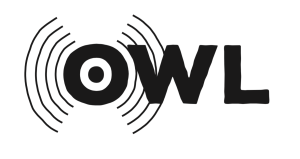What happens when you introduce a 70 (ish) year old community radio host to a 25 (ish) year old sound artist and ask them to organize ten years worth of community radio interviews? You get a podcast. Even better, you get a podcast that brings together in-depth perspectives on topics of social justice, civil rights, gender activism, ageing, and international justice. This recent collaboration between Rose Marie Whalley, host of CKUT’s Older Women Live (OWL), and Michelle Macklem, an ACT research assistant and Media Studies graduate student, prompted us to track Michelle down and ask her to reflect on her experience with intergenerational collaboration.
The seed for this collaboration was planted several months ago. Rose Marie Whalley approached ACT to find out what she could do with the ten years of interviews she had amassed as host of her community radio show. She was facing a common problem of the digital age – what to do with an archive of digital files? Together, we started thinking about how to share ten years worth of recorded interviews with an audience beyond the original radio listeners. We put Rose Marie in touch with our research assistant Michelle Macklem. Together, they decided to organize Rose Marie’s interviews thematically to create a series of ten podcasts that draw from her archived interviews and, keeping consistent with the radio show on CKUT, they’ve called the series Older Women Live.
Rose Marie Whalley was facing a common problem of the digital age – what to do with an archive of digital files?
Key to creating a successful collaboration involves figuring who is going to do what. Rose Marie is the narrator of the podcasts and Michelle has done most of the technical editing and sound treatment. They write the script together, which “usually involves multiple re-writes and becomes very iterative.” They then work through the content together, record narrative, and do a first mix and a first listen. After that, Michelle takes the piece home to add music and polish it one last time. Michelle describes the current podcast as a mix of “more interview style reporting with a bit of background information and narration from Rose Marie.”
Michelle values collaboration in her other sound work but hadn’t worked intergenerationally prior to working with Rose Marie. From the get-go, Michelle acknowledged how beneficial it’s been to work with an older media maker. Specifically, she’s learned a lot from Rose-Marie’s script writing and narration skills. She also described, with admiration, Rose Marie’s willingness to bring a combination of “pedagogy and activism to the airwaves.” Before Rose Marie became the voice of OWL, she worked as a teacher and she has been an activist for decades.
In addition to all of the positive elements of this collaboration, Michelle acknowledged that both she and Rose Marie have experienced challenges:
I don’t think either of us would say it was easy to work collaboratively at first … we had two different ways of communicating (but) we’re pretty open with each other about sitting down and having a proper conversation, which to me is the most important thing about working with other people.
Discussions have also emerged from the different perspectives they’ve had on what the role of the narrator should be and, in a sense, these challenges have emerged from the different forms of radio Michelle and Rose Marie are accustomed to, given their ages:
We have two different ideas of what radio is and how the form has changed. The state that (radio) is in right now involves a lot of first person narration: people talking about their own situated or embodied experience … Whereas, about 20 years ago, and still now – particularly in news documentaries – the reporter is expected to be more objective.
For this project, Michelle wanted to situate Rose Marie at the centre of the interviews because Rose Marie is a naturally engaging storyteller and an excellent narrator. However, Rose Marie was not always comfortable with that kind of positioning; she did not want the stories to be about her. Eventually, they reached a compromise that Michelle describes as “a mix of interview style reporting with a bit of background from Rose Marie that explains why she did the initial interview.”
Michelle related what she has learned through this collaboration to what she sees as a need for diversification in radio and podcasting. While the growing popularity of podcasts and the reasonable accessibility of podcasting technologies have made it easier for people to participate in public conversations on a huge range of topics, Michelle pointed out that older people remain undervalued:
I think the problem with podcasting right now is that it’s very white and young. People are seeing podcasts as a great democratization of media, I don’t necessarily think this is true because it’s still a very specific type of person who is doing it. And, to open it up, we need to be more inclusive of age and learning from people.
In addition to bringing a wider range of voices to the airwaves, this project will bring new life to an important collection of interviews that would have otherwise been archived and, quite possibly, lost. The Older Women Live podcast series also reminds us that old media forms are not fated to gather dust on shelves; instead, they can be reimagined through new media forms.
The first episode, released March 10th 2016, explores representations of women in media and includes interviews with Andrea O’Reilly (York University) and ACT researcher Josephine Dolan (University of the West of England). The radio broadcast of the first episode of the podcast airs at CKUT 90.3 FM in Montreal on March 9th, from 6 p.m. to 7 p.m. To celebrate the launch, ACT will host a vernissage at Concordia University on Friday, March 11th, from 4 p.m. to 6 p.m.
Thanks to Constance Lafontaine and Michelle Macklem for their contributions to this article.




